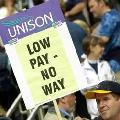
Unison’s national delegate conference met in Bournemouth on 15-18 June. Against the background of the attacks of the Con-Dem government on public services and public sector workers, this was the most important conference to be held by the union.
Despite outbreaks of anti-Tory/Con-Dem rhetoric, the mood however seemed fairly flat. Part of the reason for this is that the agenda items were formulated before the general election, so nobody knew which party would be in power. Further, the Con-Dem’s budget proposals were only known the week after the conference finished, making it difficult to focus on specific areas.
Add to that the large number of items kept off the agenda by the Standing Orders Committee, suspected of deliberately trying to create a non-controversial ’showcase’ conference and the lack-lustre quality of the union’s national leadership. The preparation for battles ahead had a damp squib air about it.
In his keynote speech, general secretary Dave Prentis at least promised national industrial action if the Con-Dems attacked our pension schemes. But for other aspects of fighting cuts it seems that branch by branch action, with no national industrial action, is all that is envisaged.
This means that stronger branches will make a stand, inevitably with mixed results, whilst weaker branches could go under in a welter of attacks on jobs, pay and conditions of service. More worryingly the right wing national executive (NEC) backed agenda items indicating a favourable attitude to privatisation by co-operatives and other mutual organisations, as if that made it much better! An emergency motion from the NEC and certain branches had a shopping list of measures to fight cuts, but again devoid of a national industrial action strategy.
There were three main points of contention between the NEC and the delegates during the week. One was where the creation of a new service group, combining higher and further education members was rejected, largely as a result of poor pre-conference consultation with the branches concerned.
A central role for trades councils in the battle against the Total Place privatisation scheme was successfully opposed by the NEC. A rule change proposed by the Bolton branch seeking to limit the length of time that Unison members could be banned from holding office as a disciplinary measure to two years was backed by a majority of votes, but narrowly missed the two thirds necessary to change the rules.
In effect this item became a referendum on the witch-hunt, and conference delegates were angered by the initial refusal of vice president Angela Lynes to allow a card vote, despite having allowed one on the previous item, that no delegates actually requested.
A stand-off between platform and delegates developed, with delegates stamping their feet and demanding the card vote, refusing to move on with the business. Eventually Lynes was forced to back down and allow the vote!
The witch-hunt against Socialist Party members and other lefts rumbled through the conference, and was dealt with by tactics worthy of the East German Stasi secret police. Delegates who referred to it had the microphone turned off, one delegate was ejected from conference for wearing a T-shirt in support of Yunus Bakhsh, a witch-hunted activist from the Northern region!
A Coffee Republic coffee bar with a public entrance and an entrance that only delegates could access was forced to close its public entrance in case any expelled or banned members used the public entrance and spoke to conference delegates!
A Reclaim the Union fringe meeting, addressed by Glenn Kelly, Caroline Bedale and Yunus Bakhsh, all witch-hunted activists, attracted a large turnout, over 300 of whom marched behind the speakers back to the conference in order to protest at the witch-hunt. Most Unison members understand that the fight against this vicious Con-Dem government to defend jobs, pay and conditions of service will be undermined by the scandal of the ongoing witch-hunt.
50 attended the Socialist Party meeting, where Peter Taaffe, Glenn Kelly and Roger Bannister spoke. Almost £2,000 was collected for the Fighting Fund.
Unison election: Over 42,000 votes for socialist candidateONCE AGAIN, Socialist Party member Roger Bannister has won a very respectable vote in the Unison general secretary election. He spoke to Jane James shortly after the vote was announced: "Against the background of the Con-Dem government and today’s budget statement heralding major attacks on public sector workers, the result of the general secretary election shows increased support for socialism and militant trade unionism. I believe this is the beginning of the process of radicalisation of Unison members which will be accelerated as the Con-Dem attacks continue. "As I predicted, the result for the United Left demonstrates once again the lack of support for their programme and tactics. "In particular, the failure in the United Left to put forward a clear position on disaffiliation from the Labour Party meant they suffered in this ballot. "If they do not re-consider their position as a result of this election then the only victors will be the right wing at next year’s national executive elections." Results:Dave Prentis (current gen sec. and Labour) 145,351 votes (67.2%) Roger Bannister (Socialist Party member) 42,651 votes (19.7%) Paul Holmes (United Left) 28,114 votes (13%) Turnout: around 17% |

Be the first to comment